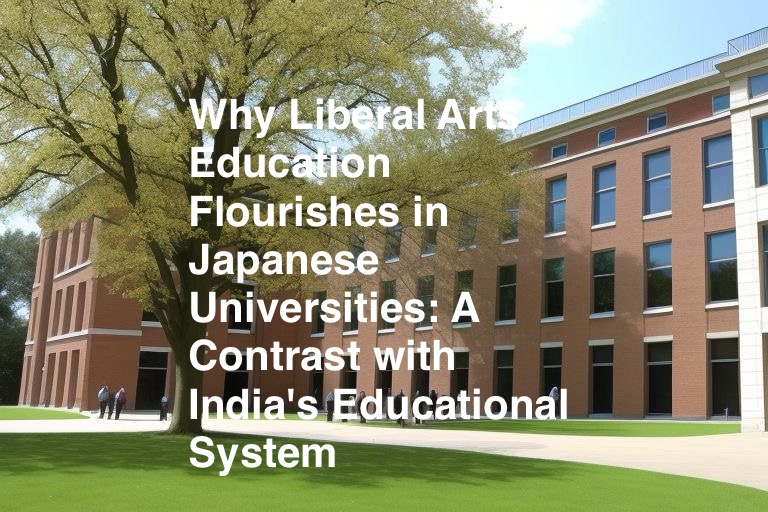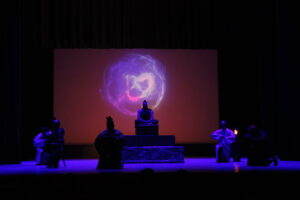Why Liberal Arts Education Flourishes in Japanese Universities: A Contrast with India’s Educational System

In Japan, a noticeable trend in higher education is the prevalence of liberal arts programs compared to science-focused courses. This emphasis on liberal arts is rooted in several historical, cultural, and societal factors that shape the educational landscape of the country. Interestingly, this approach contrasts sharply with the educational trends in India, where the focus is predominantly on science, technology, engineering, and mathematics (STEM).
Here is a quick summary before you want to dive in details
Japan’s Preference for Liberal Arts Education:
– Holistic Skills:Emphasizes critical thinking and communication.
– Western Influence:Inspired by Western models and pioneers like Joseph Hardy Neesima.
– Interdisciplinary:Combines various fields for comprehensive education.
– Adaptability: Focuses on creativity and flexibility.
– Employer Value:Appreciates transferable skills.
– Government Support:Strong backing for broad-based education.
– Global Perspective: Prepares culturally literate graduates.
India’s Preference for STEM Education:
– Specialized Focus: Emphasizes STEM disciplines.
– Economic Need: Driven by demand for tech and engineering professionals.
– Historical Context:Influenced by colonial history and economic stability.
– Technical Training:Prioritizes specialized education.
– Emerging Change: NEP 2020 indicates a shift towards liberal arts integration.
Holistic Development and Educational Philosophy
Liberal arts education in Japan is deeply valued for its focus on the holistic development of students. This approach nurtures critical thinking, communication, and problem-solving skills. Japanese educational philosophy traditionally values well-rounded individuals who can adapt to various roles in society. This holistic approach is believed to better prepare students for the complexities of modern life. In contrast, the Indian educational system places a strong emphasis on STEM disciplines, driven by the country’s rapid technological advancement and demand for skilled professionals in engineering and IT sectors.
Historical and Cultural Influences
The tradition of liberal arts in Japan has historical roots influenced by Western education models, particularly those from the United States. Pioneers like Joseph Hardy Neesima, who studied abroad, introduced these educational philosophies to Japan. Neesima, upon returning from his studies in the U.S., founded Doshisha University with an emphasis on a broad-based education that integrates humanities, social sciences, and natural sciences. This blend of disciplines has become a cornerstone of Japanese higher education. On the other hand, India’s educational system has been significantly shaped by its colonial past and a cultural emphasis on disciplines that promise economic stability. The establishment of prestigious institutions like the Indian Institutes of Technology (IITs) and Indian Institutes of Management (IIMs) highlights the focus on technical and managerial education.
Interdisciplinary Approach and Economic Needs
Liberal arts programs in Japan encourage an interdisciplinary approach, combining knowledge from various fields. This method prepares students to think across boundaries and integrate diverse perspectives, which is essential in a rapidly changing global landscape. Additionally, Japan’s economy and society benefit from graduates who can think creatively and adapt to various roles. The flexibility and innovation fostered by a liberal arts education are crucial for addressing modern challenges. In contrast, India’s educational institutions often prioritize specialized and technical training to meet the country’s economic needs, driven by the booming technology sector and industrial growth.
Employment Trends and Government Policies
Employers in Japan highly value the transferable skills gained from a liberal arts education. Skills such as critical thinking, effective communication, and the ability to work collaboratively are in high demand across various industries. Furthermore, Japanese government and educational policies have historically supported liberal arts education. Institutions like Doshisha University have played a significant role in shaping the educational landscape by promoting this model. Conversely, in India, the job market highly values technical expertise, reflecting the government’s push towards STEM education to support its burgeoning technology and engineering sectors. The National Education Policy (NEP) 2020, however, signals a shift towards a more holistic and flexible educational framework, which could see an increased emphasis on liberal arts in the future.
Globalization and Cultural Literacy
As Japan continues to globalize, there is an increasing recognition of the need for graduates who are culturally literate and can engage with global issues. Liberal arts education provides a strong foundation for understanding and interacting with diverse cultures and addressing global challenges. This global perspective is increasingly important in today’s interconnected world. India, too, is recognizing the importance of a global perspective, yet its educational focus remains largely on producing technically skilled professionals. However, initiatives under NEP 2020 aim to integrate liberal arts education, reflecting a gradual shift towards a more balanced educational approach.
In summary, the prominence of liberal arts courses in Japanese universities reflects a balanced approach to education. This approach prepares students for a wide range of future careers and societal contributions, emphasizing the development of adaptable, innovative, and culturally literate individuals. In contrast, India’s educational system, while highly successful in producing STEM professionals, is beginning to recognize the value of a more holistic educational framework, suggesting an evolving landscape that could increasingly incorporate the benefits of liberal arts education.




